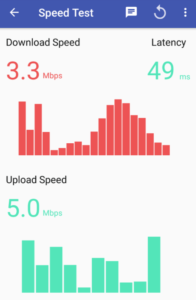
Passionate People
Brian Tuttle
Since Oscium's acquisition of MetaGeek, I've gotten to spend some time with...
Have you ever heard a friend, relative, or customer say something similar to “My internet is sooo slow… the {insert ‘bandwidth’, ‘throughput’, and/or ‘internet speed’ here} is just terrible … ?”
Bandwidth. Throughput. Two different things; commonly used interchangeably.
Does this describe your internet speeds?
Have you ever heard a friend, relative, or customer say something similar to “My internet is sooo slow… the {insert ‘bandwidth’, ‘throughput’, and/or ‘internet speed’ here} is just terrible … ?”
I am going to take a gander and say this is likely something you hear all the time. It may even be something you say all the time. But, what is the truth behind this type of statement? Is bandwidth the issue? Is throughput the issue?
The truth is that the root cause behind slow internet issues can be due to a bandwidth issue, due to a throughput issue, due to both, or even due to something entirely different. This post will describe what bandwidth is, what throughput is, and ways they contribute to poor internet performance. As for the something entirely different, keep an eye on this blog as this is the first in the series of “Why in Tarnation is My Wi-Fi So Slow?!”
The information highway. Also, just a highway.
**What is Bandwidth, anyways?
Bandwidth is how much data CAN flow through a connection at a time.**Think of bandwidth as a road you drive on. The more lanes the road has, the more capacity, or bandwidth, the road has for cars to travel on it at a given time. Now, let’s expand that concept and imagine a road trip from your home in a suburb to a friend’s house in the next city over. You will likely start on a single lane road through your neighborhood, go onto a double-lane road towards the freeway, then on the multi-lane freeway to the off-ramp for your friend’s house, and reverse the process from there. Freeways and main roads commonly have more capacity than the typical neighborhood road. Similar to roads and freeways, the internet has this same basic infrastructure. Over long distances, data is carried through high capacity lines, and as data branches off towards your local area, it starts to travel on lower and lower capacity connections until it hits your house. Furthermore, the bandwidth which you have at your house is typically capped by your Internet Service Provider (ISP) according to the service plan level you purchased.
Well then, what is throughput?
Throughput is how FAST data IS flowing through a connection at a time.
Throughput can be limited by amount of available bandwidth.
Going back to the road trip example, you can only travel as fast as speed limits and traffic allow you to your friend’s house. Local roads typically have traffic signs, lights, and slower speeds that you have to deal with. Freeways allow you to drive faster and with less interruption. However, all of these roads have a certain capacity and if everyone else is using the same roads at the same time as you, then you are probably dealing with rush hour and slowness due to max capacity. Furthermore, if you travel the roads when traffic is light, then a main factor in how fast you get to your friend’s house may depend on the car you are driving. After all, fast cars are fast and slow cars are slow. Relating back to internet speeds, if bandwidth is reaching max capacity, throughput speeds will likely be affected. As data is transferring from high bandwidth connections to lower bandwidth connections and If data is traveling through outdated infrastructure, then throughput speeds will also likely be affected.
This is great info! So, when is it a bandwidth issue?
Let’s all stream together!
Do you like to stream TV shows in your bedroom before you go to sleep? At the same time, are your kids playing online multiplayer games in their rooms while your spouse is in the family room streaming their favorite show? During times like these, do you find yourself complaining about constant buffering? If this is the case, then it is likely a bandwidth issue. Simultaneous usage involving downloading large amounts of data will test the limitations of your bandwidth and your internet plan! Furthermore, with some internet connection types, you may be sharing a larger amount of available bandwidth with your neighbors that are also getting their digital fix before bedtime (I hope you and your neighbors get along!).
**And when might it be a throughput issue?**Oh, boy. This is where the fun starts. Throughput will be a main theme in the “Why in Tarnation is My Wi-Fi Slow” series!
But, for this post… Let’s go with: you get what you pay for.
You may have purchased a plan with lower download/upload speeds. Many ISPs sell their internet plans by promoting the max download and upload speeds for each option. ISPs will also ensure that you will only get up to those advertised speeds and nothing more. If you are trying to stream a movie in HD and have a plan for max 10 Mbps download speeds, then you may consider a plan with higher download speeds. Or, maybe you have a great plan and are getting 40 Mbps download speeds but your laptop is from 2002 and uses an 802.11b wireless adapter. If that’s the case, update your equipment! Fast internet speeds don’t do much good on older, outdated equipment.
I hope this provides you with a good high level understanding of bandwidth vs throughput and that maybe this even helps you resolve some internet (and road trip) issues you may be experiencing! Stay tuned for the continuation of this series for more throughput education goodness!
Subscribe to Signifi Personal.

If you're ready to take control of your Wi-Fi and make it feel like magic for your users, we are here to help.